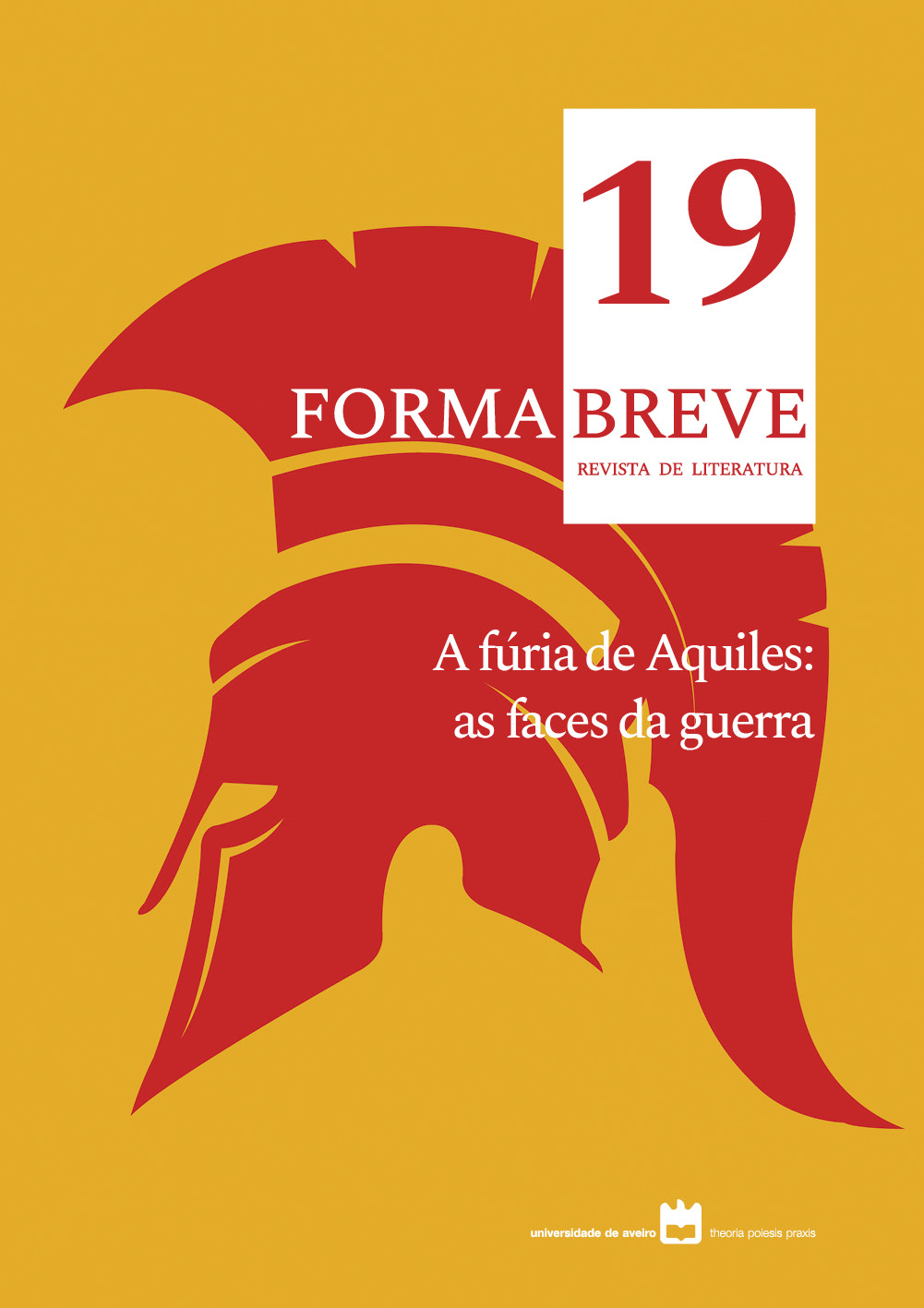Aquiles e Políxena em As Troianas, de Hélia Correia e Jaime Rocha: time e kleos no masculino e no feminino
Resumo
Em As Troianas (2018), Hélia Correia e Jaime Rocha reescrevem o rescaldo da queda de Troia, abordando como episódios centrais a repartição dos troféus femininos e os sacrifícios de Políxena e Astíanax. A evidente inspiração em Eurípides é permeada por opções originais, e expressa com uma vivacidade por vezes cómica, assente na mescla de coloquialidade e lirismo. O protagonismo dos dois Eácidas e a obsessiva evocação, por parte do jovem Pirro, dos feitos do pai em sucessivas discussões com Agamémnon torna pertinente um paralelo com Troianas, de Séneca. A obra do estoico explora o contraste entre a brutalidade egoísta de Aquiles e seu filho, e a moderação preconizada por um Agamémnon mais humanizado. Ainda assim, este vê-se obrigado a obedecer aos caprichos divinos, transmitidos pelo insensível Calcas. O Pirro de Hélia Correia e Jaime Rocha é contraditório – brutal com Políxena, mas empenhado na sobrevivência da família de Heitor – e assim moderno.
Hélia Correia e Jaime Rocha continuam a denunciar os horrores da “guerra e os seus entusiasmos” vãos, que perpetuam um modelo heroico bárbaro (Perdição – Exercício sobre Antígona, p. 4036): logo no prólogo, através de um inovador coro de lobos, que expõe a cíclica autodestruição dos humanos como absurda violação das leis da Natureza; e sobretudo, ao longo da peça, pela exposição da fúria bárbara e imoral de Aquiles, que intervém como espectro para impor a supremacia da Morte sobre a Vida. A condição de vítima excecional de Políxena possibilita o enquadramento da sua resistência no âmbito da temática feminista, já presente nas peças anteriores de Hélia Correia.
Além da análise do modo como As Troianas de Hélia Correia e Jaime Rocha aproveitaram e inovaram as criações da Antiguidade – sobretudo as citadas –, será evidenciada a absoluta atualidade das reflexões do passado sobre o impacto da guerra e o heroísmo no feminino.
Downloads
Referências
Correia, Hélia & Rocha, Jaime. (2018). As Troianas. Coimbra: Imprensa da Universidade de Coimbra.
Correia, Hélia. (2006). Perdição. Exercício sobre Antígona. Lisboa: Relógio D’Água.
Eurípides. (2017). As Troianas. In Maria Helena da Rocha Pereira, Obras de Maria Helena da Rocha Pereira III: Traduções do Grego (pp. 327-402). Coimbra: Imprensa da Universidade; Fundação Calouste Gulbenkian.
Eurípides. (2010). Tragédias (vol. I), coord. de Maria de Fátima Sousa e Silva, introd., trad. do grego e notas de Frederico Lourenço et al. Lisboa: Imprensa Nacional - Casa da Moeda.
Ovídio. (2014). As metamorfoses, trad. de Paulo Farmhouse Alberto, 3ª ed. Lisboa: Livros Cotovia.
Séneca. (2021). Tragédias (Vol. I), trad., introd. e notas de Ricardo Duarte. Lisboa: Edições Setenta.
Séneca. (2006). A felicidade e a tranquilidade da alma e outros diálogos filosóficos, introd., notas e trad. de Ricardo Ventura, posfácio de José Carlos Fernández. Lisboa: Ésquilo.
Andreadaki-Vlazaki, Maria. (2015). Sacrificies in LM IIIB: Early Kydonia Palatial Centre. Pasiphae, Rivista di Filologia e Antichita Egee, 27-42.
Bothmer, Dietrich von. (Apr.-Jun., 1944). The Painters of “Tyrrhenian” Vases”. American Journal of Archaeology, 48(2), 161-170.
Calder, William M. (1966). A Reconstruction of Sophocles’ Polyxena. Greek, Roman and Byzantine Studies, 7, 31-56.
Lawrence, Stuart. (2010). Stoic morality and Polyxena’s ‘free’ death in Euripides’ Hecuba. Acta Classica, 53, 21-32.
Melo. J. Silva. (2006). Continuar a escrever. In Maria de Fátima Silva (Coord.), Furor. Ensaios sobre a obra dramática de Hélia Correia (pp. 7-10). Coimbra: Imprensa da Universidade de Coimbra.
Neer, Richard. (Spring/Autumn 2012). «A tomb both great and blameless»: Marriage and murder on a sarcophagus from the Hellespont. RES: Anthropology and Aesthetics, 61/62, Sarcophagi, 98-115.
Recht, Laerke. (2014). Symbolic order: liminality and simulation in the Bronze-Age Aegean and Near East. Journal of Religion and Violence, 2(3), 403–432.
Silva, Maria de Fátima Sousa. (2005). Sacrifício voluntário, teatralidade de um motivo euripidiano. In Maria de Fátima Sousa e Silva, Ensaios sobre Eurípides (pp. 125-165). Lisboa: Cotovia.
Vernant, Jean-Pierre, & Vidal-Naquet, Pierre. (1972). Mythe et tragédie en Grèce ancienne. Paris: François Maspero.
Direitos de Autor (c) 2023 Maria José Ferreira Lopes

Este trabalho está licenciado com uma Licença Creative Commons - Atribuição 4.0 Internacional.








